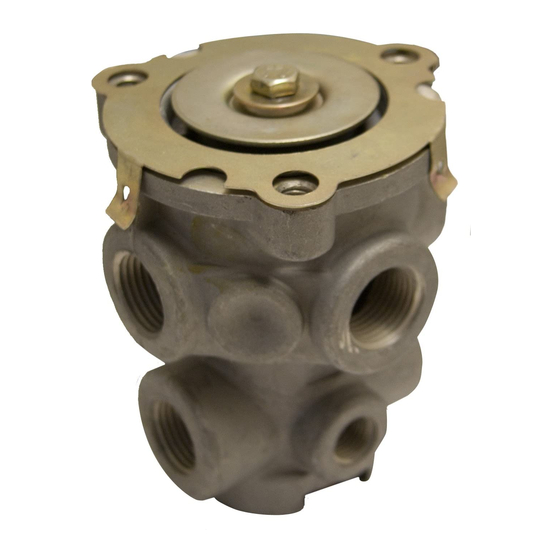BENDIX E-2 Handbuch - Seite 3
Blättern Sie online oder laden Sie pdf Handbuch für Kontrolleinheit BENDIX E-2 herunter. BENDIX E-2 4 Seiten. Brake valves

Insert Disassembly
NOTE: It is recommended that entire inlet/exhaust insert
be replaced as an assembly.
7. Remove o-ring (17) from check valve seat (16).
8. Remove screw (20), washer (19), and diaphragm (18).
9. Depress and hold insert, and remove preload spring (21).
10. Remove inlet/exhaust valve (14), valve spring (13), and
o-ring (15).
11. Remove valve retainer (12).
Cleaning and Inspection
Wash all metal parts in mineral spirits and dry. Wipe all
rubber parts clean.
Inspect all parts for excessive wear or deterioration.
Inspect valve and valve seats for nicks and burrs.
Check springs for cracks, distortion or corrosion.
Inspect exhaust check diaphragm for flexibility, wear, and
deterioration.
Replace all parts not considered serviceable during these
inspections.
ASSEMBLY
1. Lightly lubricate the piston, valve bores, and o-rings with
Dow Corning 55-M pneumatic grease (Our piece number
291126).
2. Position rubber spring (10) in piston (7).
3. Install spring seat (9), washer (8), and cap screw (6).
Torque cap screw to 50 inch pounds.
4. Install piston o-ring (3) and place piston return spring (2)
in body.
5. Install piston retainer (4). Be certain the prongs snap
over groove in valve body.
Insert Assembly
6. Position preload spring (21) in exhaust check valve seat
(16).
7. Install diaphragm (18), diaphragm washer (19) (with lips
pointing out), and install screw (20). Tighten screw
securely.
8. Install o-ring (15) and valve retainer (12) on inlet / exhaust
valve body (14).
9. Install valve spring (13) on exhaust check valve seat (16)
and install inlet/exhaust valve (14) into exhaust valve seat
(16). Press the valve down until the preload spring snaps
and holds the assembly together.
10. Install o-ring (17) on exhaust check valve seat (16).
11. Place inlet/exhaust insert in valve body; position
identification washer. Press the insert down while
installing retaining ring (1). Make certain retaining ring
snaps into body groove, thus locking in the insert in
place.
3
Testing A Rebuilt E-2
™
or E-3
Perform operating and leakage tests as outlined in "Service
Tests" section.
WARNING! PLEASE READ AND FOLLOW
THESE
INSTRUCTIONS
PERSONAL INJURY OR DEATH:
When working on or around a vehicle, the following
general precautions should be observed at all times.
1. Park the vehicle on a level surface, apply the
parking brakes, and always block the wheels.
Always wear safety glasses.
2. Stop the engine and remove ignition key when
working under or around the vehicle. When
working in the engine compartment, the engine
should be shut off and the ignition key should be
removed. Where circumstances require that the
engine be in operation, EXTREME CAUTION should
be used to prevent personal injury resulting from
contact with moving, rotating, leaking, heated or
electrically charged components.
3. Do not attempt to install, remove, disassemble or
assemble a component until you have read and
thoroughly understand the recommended
procedures. Use only the proper tools and observe
all precautions pertaining to use of those tools.
4. If the work is being performed on the vehicle's air
brake system, or any auxiliary pressurized air
systems, make certain to drain the air pressure from
all reservoirs before beginning ANY work on the
vehicle. If the vehicle is equipped with an AD-IS
air dryer system or a dryer reservoir module, be
sure to drain the purge reservoir.
5. Following
the
recommended procedures, deactivate the electrical
system in a manner that safely removes all
electrical power from the vehicle.
6. Never exceed manufacturer's recommended
pressures.
7. Never connect or disconnect a hose or line
containing pressure; it may whip. Never remove a
component or plug unless you are certain all
system pressure has been depleted.
8. Use only genuine Bendix
components and kits. Replacement hardware,
tubing, hose, fittings, etc. must be of equivalent
size, type and strength as original equipment and
be designed specifically for such applications and
systems.
9. Components with stripped threads or damaged
parts should be replaced rather than repaired. Do
not attempt repairs requiring machining or welding
unless specifically stated and approved by the
vehicle and component manufacturer.
10. Prior to returning the vehicle to service, make cer-
tain all components and systems are restored to
their proper operating condition.
™
Brake Valve
TO
AVOID
vehicle
manufacturer's
®
replacement parts,
™
